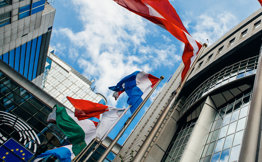Rome was not built in a day, in fact, like the rest of Europe, it is still being built.
Following the financial crisis, Europe has focused on attracting greater investment in the hope of strengthening its global competitiveness and supporting economic growth.
However, this growth is yet to be felt equally across many of the EU’s Member States, with Europe as a whole lagging behind in key areas such as cross-border finance, infrastructure investment and digitalisation.
These issues, among others, were discussed in early December at the 2019 Rome Investment Forum organised by FEBAF and with support from AFME, where senior figures spanning Italy and the broader EU economic and political landscape gathered, emphasising patience and persistence in the face of various challenges.
Paolo Gentiloni, EU Commissioner for Economy, in his keynote address shared optimism regarding the change we could expect from the new Commission elected in November.
He felt the new Commission has arrived at a more favourable time compared to the previous one. While the Juncker Commission took office in the aftermath of the financial crisis and had to overcome the challenges facing the single currency, the new Commission is taking office after years of moderate growth and relative stability.
Gentiloni said this means, while there are complicated challenges for the Commission to face, there is a greater opportunity to tackle issues that are social and environmental.
Similarly, Guest of Honour, Giuseppe Conte, Prime Minister of Italy discussed the Italian roadmap for boosting investment through public and private partnerships, as well as investment in innovation and sustainability. Conte highlighted the challenges Italy faces in how to improve competitiveness amid increased globalisation.
As part of the opening plenary session AFME’s Chairman, Michael Cole-Fontayn, emphasised the key topics for discussion, “Competitiveness”, “Sustainability”, and “Growth”.
He said Europe must continue its push to become more competitive than other regions by increasing cross border investment which in turn will help progress the Capital Markets Union Project (CMU).
Earlier in the year AFME published its key performance indicators report measuring the progress of the CMU, highlighting how the flow of capital continues to be fragmented along national lines and capital markets need further scale and depth to support economic growth and innovation.
Cole-Fontayn highlighted the report findings for Italy, which show that while it is a leader in disposing of non-performing loans, representing 53% of the EU total in 2018, it is lagging behind other EU Member States in certain areas of the CMU project, such as providing funding for Fintech companies and making risk capital available for SMEs.
In order to achieve the goals of the CMU, Fabio Massimo Castaldo, the Vice President of the European Parliament spoke of the need for carefully designed industrial policy.
Roberto Gualtieri, Italian Minister of Economy and Finance, concurred saying there is a need to define a new single industrial strategy that allows EU companies to reduce emissions, develop digitisation and leadership in tech.
Speaking on the panel, David Wright, Chairman of Eurofi, warned that if the EU continues to go down the same route, where there has been fragmentation and a lack of decision-making, in five years’ time the EU will be discussing the same unresolved issues.
Highlighting the recent progress made in sustainable investing, Mario Nava, Director of Horizontal Policies, DG FISMA at the European Commission, said we are now seeing conversations surrounding sustainable investments become more nuanced.
He said while the questions posed to firms previously revolved around what they were doing to help the environment, today the questions are more specific around how the nature of the market will affect their assets.
On the topic of the future post-Brexit relationship between the EU and UK, David Marsh, Chairman of the Official Monetary and Financial Institutions Forum (OMFIF), optimistically said he thinks the UK could in fact become more European following its exit.
He suggested that after Brexit the UK will no longer have the EU to blame for its domestic issues, giving more responsibility to UK politicians and a greater opportunity to appreciate the merits of the EU.
The session concluded with panellists agreeing that like the historic city of Rome where the forum was hosted, the European Union is a project that cannot be built in a day, and it is on a long journey to fulfil its potential.




